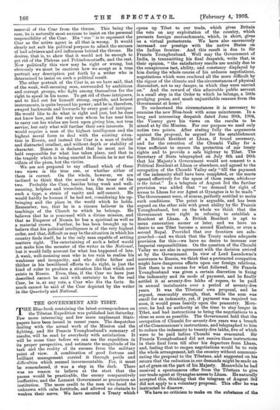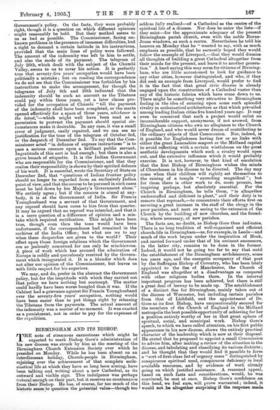opens up Tibet to our trade, which gives Britain the
veto on any exploitation of the country, which prevents foreign encroachments, which, in short, gives us a virtual protectorate. We have also enormously increased our prestige with the native States on the Indian frontier. And this result is due to Sir Francis Younghusband. Well may the Government of India, in transmitting his final despatch, write that, in their opinion, " the satisfactory results are mainly due to the conspicuous tact, ability,• and constancy displayed by him during the whole course of his arduous negotiations, negotiations which were rendered all the more difficult by the rigour of the climate and the circumstances of physical discomfort, not to say danger, in which they were carried on." And the reward of this admirable public servant is a small step in the Order to which he belongs, a little grudging praise, and, much unjustifiable censure from the Government at home!
To understand the circumstances it is necessary to examine the new Blue-book with some minuteness. In a long and interesting despatch dated June 30th, 1904, the Viceroy gave his views on the results to be aimed at by the Mission. For our purpose we need only notice two points. After stabing fully the arguments against the proposal, he argued for the establishment of a British Resident at Lhasa, if found necessary, and for the retention of the Chumbi Valley for a time sufficient to ensure the protection of our treaty rights and to provide a safe highway to Tibet. The Secretary of State telegraphed on July 6th and 26th that his Majesty's Government would not consent to a Political Resident at Lhasa or elsewhere, and agreed to the occupation of the Chumbi Valley only "till the payment of the indemnity shall have been completed, or the marts opened effectively for the space of three years, whichever is the latest." In a telegram of August 3rd the further provision was added that " no demand for right of access to Lhasa for our Agent at Gyangtse is to be made." The Government were, of course, perfectly entitled to make such conditions. The point is arguable, and has been argued on the other side with great ability by Sir Francis Younghusband, but on the whole we think that the Government were right in refusing to establish a Resident at Lhasa. A British Resident is apt to mean annexation sooner or later, and we have no desire to see Tibet become a second Kashmir, or even a second Nepal. Provided that our frontiers are safe- guarded—and we think that the Treaty makes adequate provision for this—we have • no desire to increase our Imperial responsibilities. On the question of the Chumbi Valley we are also in agreement with the decision arrived at by the Government. In view of Lord Lansdowne's assurance to Russia, we think that a protracted occupation might have dangerous effects upon our foreign relations. But there is no excuse for what followed. Sir Francis Younghusband was given a certain discretion in fixing the indemnity and its mode of payment, and he finally settled it at seventy-five lakhs of rupees, to be paid. in annual instalments over a period of seventy-five years. It was the Tibetans' own proposal, and he argued, reasonably enough, that, while the sum was small for an indemnity, yet, if payment was required too soon, it would press heavily upon the peasantry. More- over, he had no authority at the time to stay longer in Tibet, and had instructions to bring the negotiations to a close as soon as possible. The Government held that the occupation of Chumbi for seventy-five vears was a breach of the Commissioner's instructions, and telegraphed to him to reduce the indemnity to twenty-five lakhs, five of which were to be paid before Chumbi was evacuated. Sir Francis Younghusband did not receive these instructions in their final form till after his departure from Lhasa, and, feeling that to reopen negotiations would be to ruin the whole arrangement., left the country without communi- cating the proposal to the Tibetans, and suggested on his return that the reduction in our demands might be made an act of grace on the part of his Majesty. Meanwhile he bad received a spontaneous offer from the Tibetans to give our trade agent at Gyangtse access to Lhasa. He naturally accepted this, thinking that the telegram of August 3rd did not apply to a voluntary proposal. This offer he was instructed to disavow.
We have no criticism to make on the substance of the Government's policy. On the facts, they were probably right, though it is a question on which different opinions might reasonably be held. But their method seems to us as bad as possible. The Commissioner, facing un- known problems in the presence of immense difficulties, had a. right to demand a certain latitude in his instructions, provided that the main lines of policy were followed. The amount of the indemnity was left to him to settle, and also the mode of its payment. The telegram of July 26th, which dealt with the subject of. the Chumbi Valley, seems to us to cover his action. It is perfectly true that seventy-five years' occupation would have been politically a mistake ; but on reading the correspondence we do not see that the Commissioner was forbidden by his instructions to make the arrangement, for though the telegrams of July 6th and 26th indicated that the indemnity should be such an amount as the Tibetans could pay within three years, yet a later clause pro- vided for the occupation of Chumbi " till the payment of the indemnity shall have been completed, or the marts opened effectively for a space of three years, whichever is the /atest,"—whioh might well have been read as a permission to protract the payment should special cir- cumstances make it desirable. In any case, it was a small error of judgment, easily repaired, and we can see no justification for the tone of the telegram of October 3rd, or the despatch of December 2nd. To say that the Com- missioner. acted " in defiance of express instructions " is to pass a serious censure upon a brilliant public servant. Ingratitude of this sort is bad enough ; but there is also a grave breach of etiquette. It is the Indian Government who are responsible for the Commissioner, and that they realise their responsibility is shown by their spirited defence of his work. It is essential, wrote the Secretary of State on December 2nd, that "questions of Indian frontier policy should no longer be regarded from an exclusively Indian point of view, and that the course to be pursued in such cases must be laid down by his Majesty's Government alone." We entirely agree ; but if the censure is aimed at any- body, it is at the Government of India. Sir Francis Younghusband was a servant of that Government, and any reproof should have come to him from that quarter. It may be argued that no reproof was intended, and that it is a mere question of a difference of opinion and a mis- take which required rectification. This might have been true, though even then the tone would have been unfortunate, if the correspondence had remained in the archives of the India Office; but what are we to say when these despatches are given to the world ? Their effect upon. those foreign relations which the Government are so jealously concerned for can only be mischievous. A piece of work which has aroused the admiration of Europe is coldly and querulously received by the Govern- ment which inaugurated it. It is a blunder which does not alter our opinion of the Commissioner, but leaves us with little respect for his superiors.
We may, and do, prefer in the abstract the Government policy, but for the ineptitude with which they carried out that policy we have nothing but contempt. The matter could hardly have been worse bungled than it was. If the Cabinet had a grievance against Sir Francis Younghusband over the seventy-five years' occupation, nothing would have been easier than to put things right by releasing the Tibetans from the payments. The actual amount of the indemnity was a matter of no moment. It was exacted as a punishment, not in order to pay for the expenses of the expedition.











































 Previous page
Previous page